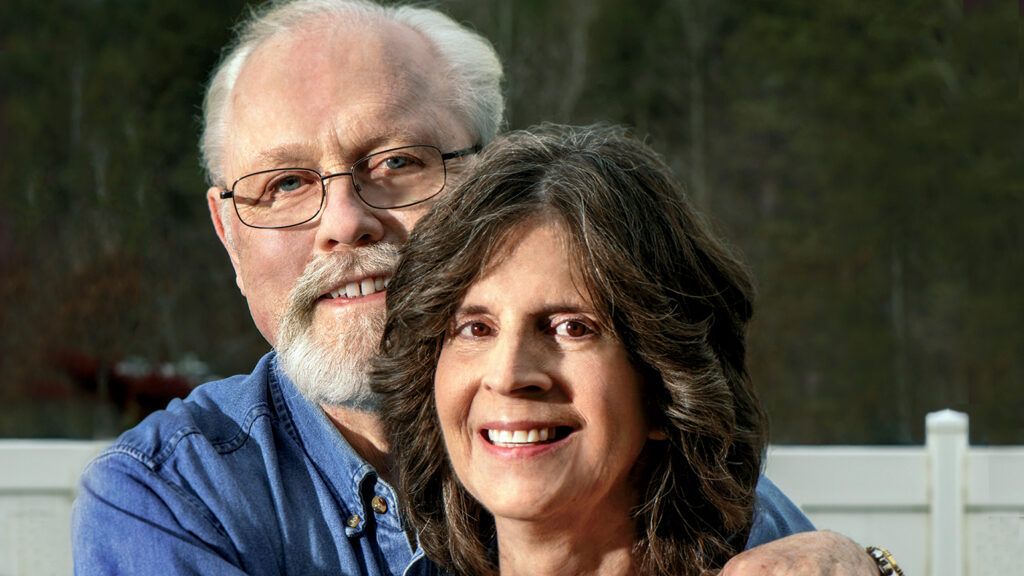My husband, Roger, and I sat in his doctor’s office, waiting to hear the results of the biopsy of his left calf. “I’m afraid it’s Stage IV metastatic melanoma,” the doctor said.
We’ve been married two months! I wanted to shout. He’s only 58! This was a second marriage for us both. God was giving us a second chance for happiness. Or so I thought.
“What’s our next step?” Roger said.
“We’ll keep you comfortable for the six months you probably have left,” the doctor said.
The words shocked me to my core, even though Roger had already had dozens of lesions removed from his skin. He’d spent most of his life in the sun, due to construction work and water sports. While we were dating, he went through a year of chemo for melanoma in the lymph nodes in his neck.
Some of my friends encouraged me to break off the relationship. “You don’t know what you’re getting yourself into,” they warned. “He’ll become an invalid, and then where will you be? He might even die.”
I worried. But Roger seemed to brush off the idea of dying, and that had given me a sense of security.
That security was gone now. When my first husband had left, I felt abandoned. This diagnosis wasn’t Roger’s fault, but it felt like another form of abandonment. I pictured myself alone in a matter of months, handling his funeral arrangements. I immediately began putting up walls around my heart. Maybe then it wouldn’t hurt so much when he died.
Roger’s oncologist told us about a Phase 2 clinical trial going on at Hillman Cancer Center in Pittsburgh, about a four-hour drive from our home in Hurricane, West Virginia. It was our only hope. Roger enrolled in the study. Still, the doctors there gave him a two percent chance of survival.
“That’s all I need,” Roger said. “I’ll be in that two percent.”
He and 37 other patients started the clinical trial together. Each received an experimental drug along with daily IV chemo treatments. The infusions left Roger shaking, running a high fever and unable to keep down any food. He even had to lean on me as we made the short walk to the place where we were staying.
“Do you want anything?” I asked.
“No, just get me to the bed,” he said.
I felt helpless to do more for Roger and questioned whether I had it in me to be the caregiver he needed.
At the end of his year-long treatment, only one other patient in the study remained alive. Roger’s next scan showed a suspicious spot on his right lung. He wasn’t fazed. “I believe I’m still alive because God has his hand on me every day,” he declared.
Roger’s unshakable faith upset me even more. How could he stay so positive? Didn’t he care that our time together would be ending far too soon? Perhaps Roger didn’t love me as deeply as I loved him. It seemed as if God had brought happiness into my life only to snatch it away. Had he abandoned me too?
The decision was made to go in and remove the lesion. “It was melanoma, but we believe we got it all,” his surgeon said after they removed half of Roger’s lung. The recovery was slow. Roger was told not to drive for six weeks, but he was anxious to get back to work as a local liaison for the state treasurer’s office, so I drove him wherever he needed.
I waited in the car while he visited with everyone. I tried bringing a book to pass the time, but all I could think about was Roger’s cancer. Each day, I worried it would be the last time he’d be able to enjoy working.
One morning, Roger said, “Wear something nice today. I’m going to take you in with me on my calls.”
At first, I remained quiet as I watched him interact with everyone. Roger was definitely in his element. I saw how his upbeat attitude and sense of humor helped him turn even strangers into friends.
He introduced me. It was fun meeting new people, and I found myself laughing and joining in the conversations, the first time I’d really laughed since Roger’s cancer journey had begun. Could his positivity be rubbing off on me?
Maybe I would be happier and do a better job as a caregiver if I tried to emulate Roger’s outlook. While I’d been focused on the 98 percent chance of him dying, he was concentrating on that two percent chance of surviving. And it wasn’t because he didn’t care about me. Roger put all his energy into living because he loved me and wanted us to make the most of our time together.
“You know I’ve struggled with how you could be so happy through all of this,” I told him. “But I think I understand now.”
Roger wrapped his hand around mine and squeezed. “You need to trust God,” he said.
He was right. I made a promise to myself to try harder. God had not abandoned me. My husband might have only a few months left, but God had put him in my life for a reason. Maybe that was what I was supposed to learn—to appreciate what I have in the moment. I thought I could do that. I hoped I could. The walls that had guarded my heart slowly began to crumble.
Roger’s dermatologist sees him every three months. The doctor has found and removed two squamous cell carcinomas, one on the tip of Roger’s finger, the other on the side of his nose.
Roger has never asked why God would allow him to endure so much. “I believe it was God’s plan for me to become a melanoma patient so that I could educate others about the harmful effects of the sun,” he says.
He encourages patients entering treatment for melanoma and tries to ease their minds so they too can make it through. He’s also part of an oncology collaborative practice at a local hospital where he represents the patient’s point of view.
Roger is now the sole survivor of his clinical trial. I continue to worry with every scan. My positive outlook may still be a work in progress, but I have a wonderful teacher. My husband has been bringing me laughter and steadfast faith for 13 years now. Whatever the future holds, God, Roger and I will get through it together, caring for each other.
For more inspiring stories, subscribe to Guideposts magazine.






